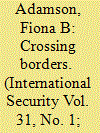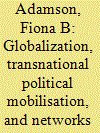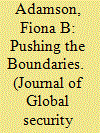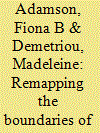|
|
|
Sort Order |
|
|
|
Items / Page
|
|
|
|
|
|
|
| Srl | Item |
| 1 |
ID:
073828


|
|
|
|
|
| Publication |
2006.
|
| Summary/Abstract |
International migration has moved to the top of the international security agenda, due in part to concerns that migration flows provide conduits for the spread of international terrorism. Although such concerns are not entirely unfounded, they must be placed within the broader context of the range of impacts-both positive and negative-that international migration flows have on states' core national security interests. Migration flows affect at least three dimensions of national security: state capacity and autonomy, the balance of power, and the nature of violent conflict. Overall, migration management presents a far greater security challenge to weak and failing states than to advanced postindustrial states. States that are able to formulate and implement migration policies that harness the power of international migration will be more secure, rather than less secure, in the new globalized security environment.
|
|
|
|
|
|
|
|
|
|
|
|
|
|
|
|
| 2 |
ID:
191728


|
|
|
|
|
| Summary/Abstract |
Former US President Donald J. Trump was infamous for his nakedly transactional approach to politics. However, as we demonstrate in this article through the lens of migration politics, this kind of unabashedly transactional approach is less an outlier than a common feature of contemporary international politics. Drawing in part upon initial findings from our ongoing Diplomacy of Forced Migration Dataset Project, we explore historical and contemporary cases to illustrate how transactional migration management ‘deals’ such as the 2022 UK–Rwanda Migration and Economic Development Partnership are not particularly new, unusual, or revolutionary. In this exploration of the long history of deal-making in the realm of forced migration management, we first define the phenomenon—which we term transactional forced migration (TFM)—and situate it within the growing literature on migration diplomacy, externalization and what is known as the instrumentalization and/or weaponization of migration. We then highlight illustrative historical precedents that presage what we are witnessing today. We additionally identify and unpack several of the under-appreciated connections between TFM schemes and other dimensions of diplomacy and international politics. We conclude with a summary of our argument, its implications for contemporary policy and a few thoughts about what current trends suggest the future is likely to hold.
|
|
|
|
|
|
|
|
|
|
|
|
|
|
|
|
| 3 |
ID:
067052


|
|
|
| 4 |
ID:
061769


|
|
|
|
|
| Publication |
Apr 2005.
|
| Summary/Abstract |
This article examines how globalisation processes provide new incentives and opportunities for non-state political entrepreneurs to build transnational political movements. Drawing on the literatures on non-violent social movements and transnational networks, the article examines terrorism and political violence as components of the ‘repertoires of contention’ used by radical transnational groups seeking political change. Examples from both the pre- and post-9/11 periods are provided, and the implications for traditional models of state security are discussed. The article concludes by contending that the combination of increased levels of globalisation and the emergence of new networks of violence is creating a fundamental shift in the international security environment, in which the distinction between internal and external security threats is increasingly blurred. While state security strategies are reflecting these changes, less attention has been paid to the political implications of these changes. New security responses need to also be matched by new sets of political strategies at the global level.
1 Versions of this article were presented at the Workshop ‘Globalisation and Security’, Olin Institute for Strategic Studies, Harvard University, Cambridge, MA, 14–16 November 2003 and at the 45th Annual Convention of the International Studies Association, Montreal, 17-20 March 2004. The author wishes to thank Nora Bensahel, Jonathan Kirshner, Sean Lynn-Jones, participants at the Olin workshop and two anonymous reviewers for their helpful comments.
|
|
|
|
|
|
|
|
|
|
|
|
|
|
|
|
| 5 |
ID:
148167


|
|
|
|
|
| Summary/Abstract |
[D]iaspora politics can be viewed as not only enhancing or challenging state power in particular cases, but also contributing to new forms of global identity politics that transcend state institutions.”
|
|
|
|
|
|
|
|
|
|
|
|
|
|
|
|
| 6 |
ID:
165252


|
|
|
|
|
| Summary/Abstract |
Academic and policy debates on migration and refugee “crises” across the world have yet to engage fully with the importance of cross border population mobility for states' diplomatic strategies. This article sets forth the concept of “migration diplomacy” as an object of analysis for academics and practitioners alike, distinguishing it from other forms of migration-related policies and practices. It draws on realist approaches in international relations to identify how the interests and power of state actors are affected by their position in migration systems, namely the extent to which they are migration-sending, migration-receiving, or transit states. The article then discusses how migration issues connect with other areas of state interest and diplomacy, including security interests, economic interests and issues of identity, soft power, and public diplomacy. Finally, the article suggests the utility of applying a rationalist framework based on states' interests in absolute versus relative gains as a means of examining the bargaining strategies used by states in instances of migration diplomacy.
|
|
|
|
|
|
|
|
|
|
|
|
|
|
|
|
| 7 |
ID:
171806


|
|
|
|
|
| Summary/Abstract |
This essay reflects on the approaches to inclusion and exclusion put forward in this special issue and suggests a more radical alternative: the project of “decolonizing” the field of security studies. Drawing on work in decolonial thought and critical security studies, I discuss systemic-level structures of inclusion and exclusion such as global racial hierarchies, imperial and colonial legacies, and North-South inequities. Such structures both shape the material reality of the global security order, and affect knowledge production in the field of security studies itself, including the definition of what is and is not viewed as a legitimate “security issue.” I conclude by asking what a “decolonized” security studies might look like.
|
|
|
|
|
|
|
|
|
|
|
|
|
|
|
|
| 8 |
ID:
079904


|
|
|
|
|
| Publication |
2007.
|
| Summary/Abstract |
The structural components of a state are regularly conflated with a state's national identity. In reality, however, the assumption that the boundaries of a state and its national identity are coterminous is problematic. While this has always been the case, changes in the ability of actors in the international system to use communication and transportation technologies to sustain transnational collective identities points to the need for new empirical research in this area. Contemporary diasporas are defined by a national or cultural identity, yet differ from nation-states in terms of their organizational and spatial logics. By comparing diaspora mobilization in two cases, we find that both non-state political entrepreneurs and state elites are using diasporic practices of identity formation as a means of generating economic and political support in an increasingly integrated global economy. This points to discontinuities between a territorially defined states system and deterritorialized practices of collective identity formation.
|
|
|
|
|
|
|
|
|
|
|
|
|
|
|
|
| 9 |
ID:
145148


|
|
|
|
|
| Summary/Abstract |
The changing political and social meanings of space under conditions of advanced globalization point to the need to analyze security—or the deployment and management of violence—as a socio-spatial practice. This article draws attention to the “methodological nationalist’ bias that has traditionally characterized mainstream security studies, and discusses its effect on how security issues are studied and conceptualized. Building on insights from political geography and sociology, the article makes the case for a “spatial turn” in the field. It demonstrates how a socio-spatial approach can help make sense of evolving state security practices, and presents examples of non-national spaces of security—including cities, cyberspace, and the global polity. Such spaces are increasingly objects of security practices, although the implications of this remain largely under-theorized in security studies.
|
|
|
|
|
|
|
|
|
|
|
|
|
|
|
|
|
|
|
|
|